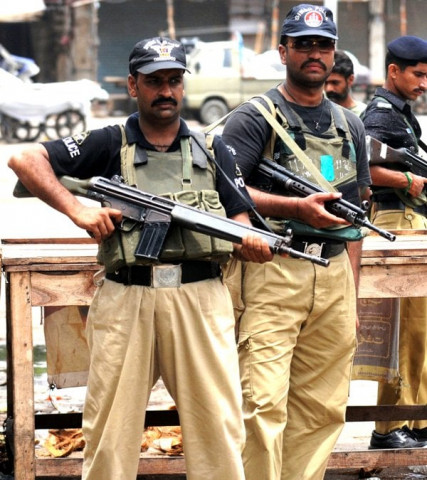New police law gives more powers to Sindh chief minister
Sindh Assembly passes bill to revive Police Order 2002 with amedments

FILE PHOTO: AFP
The bill presented in the house by the minister for parliamentary affairs, Mukesh Kumar Chawla, was earlier referred to select committee for amendments. The opposition members expressed reservations that they were not taken into confidence and their recommendations were set aside by the Pakistan Peoples Party's (PPP) select committee.
According to the new law, Sindh government will have power to appoint senior police officers from the deputy inspector-generals to deputy superintendents of police. The law states, "The CM shall post DIGs, SSPs, DSPs in consultations with IG and additional IG as the case may be". Regarding Inspector General of Police (IGP), the law said that the government shall select the IGP out of a panel of three police officers recommended by the federal government. "The term of the office of IGP shall be three years from the date of his posting. However, the provincial government may repatriate or the federal government may on its own accord recall an inspector general of police."
It further states, "The provincial public safety and police complaints commission may recommend provincial government for the repatriation of IG before the expiry of his term".
Public safety commission
The law states that there shall be a provincial public safety commission and complaints commission comprising 12 members. Half of the members of the safety commission and police complaint commission shall be nominated by the Speaker of Sindh Assembly from amongst its members. A total of four members from treasury and two from the opposition will be selected in consultation with the leader of the house, the CM, and the opposition leader. It further stipulates that at least two members must be women. The home minster and the adviser to chief minister will serve as chairperson of the provincial safety commission and police complaints commission.
The public safety commission will make recommendations to the CM for promoting integrity, efficiency and effectiveness of police. It will take steps to prevent the police from engaging in any unlawful activity arising out of compliance within unlawful or mala fide order. The provincial safety commission will also facilitate the establishment and functioning of the Citizen-Police Liaison Committee in accordance with Article 168. The law further said that the provincial safety commission can also recommend CM to repatriate IGP before completion of tenure of three-year term over unsatisfactory performance. It will also make recommendations to the CM on funds to be granted to various police establishments within the province for enhancement of their capacity to handle law and order in the province. The commission will also oversee the implementation of the provincial police plan prepared by the IGP and will make suggestions to the government about the law pertaining to police force and their reforms. Similarly, district public safety commission will also be establsihed to review the performance of police at the district level.
According to the law, the operation and investigation departments of police will work separately under the command of senior police officers. However, the government will also appoint inspectors and DSPs though public services commission as per quota and manner notified by the provincial government.
Regarding the various branches of the police, the law said that investigation, intelligence, watch and ward, reserve police, police accountability, personal management, education and training, finance and internal audit, crime prevention, crime against women, traffic planning and management, criminal identification, information technology, transport, reserve and development, legal affairs, welfare and estate management will be among the branches, divisions, bureaus in the police force.
Published in The Express Tribune, May 19th, 2019.



















COMMENTS
Comments are moderated and generally will be posted if they are on-topic and not abusive.
For more information, please see our Comments FAQ